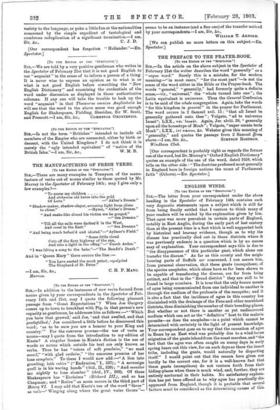[To THE EDITOR OF THE "SPECTATOR."' SIR,—In addition to the
instances of new verbs formed from nouns given by your correspondents in the Spectator of Feb- ruary 14th and 21st, may I quote the following pleasant passage from "Great Expectations " ? When Joe Gargery comes up to town to breakfast with Pip, in that person's new capacity as gentleman, he addresses him as follows :—" 'Which you have that growed,' said Joe, and that swelled, and that gentlefolked ;' Joe considered a little before he discovered this word ; 'as to be sure you are a honour to your King and country.'" For the converse process—the use of verbs as nouns—may I quote from the introduction to my edition of Keats ? A singular license in Keats's diction is the use of words as nouns which outside his text are only known as verbs. Thus he has "voices of soft proclaim," "no mad assail," "with glad exclaim," "the amorous promise of her lone complain." To these I would now add :—" A lion into growling, loth retire" ("Endyrnion," I., 537) ; " A sovereign quell is in his waving hands " (ibid., II., 539) ; " And monitor me nightly to lone slumber" (ibid., IV., 893). Of these Shakespeare has " Exclaims " (Richard and so has Chapman ; and " Retire" as noun occurs in the third part of Henry VI. I may add that Keats's use of the word " throe " as verb—" Winging along where the great water throes "—
seems to be an instance (and a fine one) of the transfer noticed by your correspondents.—I am, Sir, &c., WILLIAM T. ARNOLD.
[We can publish no more letters on this subject.—En. Spectator.]










































 Previous page
Previous page